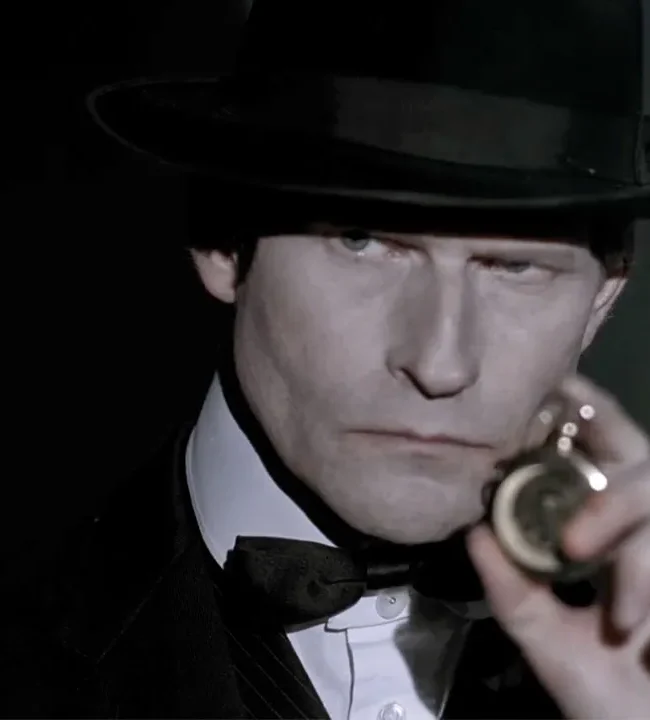MR. K

(Check out Jessica Baxter’s Mr. Kmovie review, it’s in select theaters now via Music Box Films. Seen it? Join the conversation with HtN on our Letterboxd Page.)
After over two decades of directing Dutch film and television, Tallulah Hazekamp Schwab makes her English language feature film debut with the surreal black comedy, Mr. K. Veteran eccentric Crispin Glover is perfect for the role of a traveling magician who is experiencing some existential career stagnation. On his way to a gig, he stops in an unfamiliar town, checking into a strange bucolic hotel. The next morning, he’s surprised and frustrated to learn that he cannot find the exit. None of the other inhabitants are much help. In fact, some seem downright determined to mislead him. Others insist that he must accept his new reality, as they have. Bit by bit, Mr. K uncovers the mystery of the hotel’s true nature that could be the answer to, not only his liberation, but life, the universe, and everything.
I won’t reveal too much of the plot because it’s best to experience the narrative along with Mr. K having no idea what is happening or about to happen. However, to give you a sense of the vibes, here are some films that sprang to mind while watching: Alice in Wonderland, Barton Fink, Snowpiercer, Time Bandits, Coraline, Delicatessen, and The Matrix. For a long time, Mr. K resists his absurd predicament as he tries to make sense of it. It’s not until he lets go of his drive to control his circumstances that he is able to move forward. This is also the best way to take in Schwab’s film. To walk away, as they say, you must leave something behind.
Schwab also wrote the script, which she deems her most personal work to date. She was inspired by her fascination with “doors and the idea that they conceal something unexpected.” Schwab wears her influences on her sleeve, as her title character evokes the Kafkaesque landscape that he must traverse. Growing up, she felt like she had trouble grasping the “rules” of society, because they seemed so dependent on where she was and who was imparting them to her. A principal conceit of the film is the idea that one person’s reality can be completely incomprehensible to someone else.
One thing that is very real to Mr. K is that the building which holds him prisoner, is also undergoing its own metamorphosis. He seems to be the only one who observes the changes, as the structure around him groans, cracks, bursts, and contracts. Even as residents move furniture into the hallway because it no longer fits in their room, they refuse to accept the fact that anything is different. The stunning set design goes a long way toward selling the unspoken nightmare that plagues Mr. K. The sets change over time, but the lush green of the early twentieth century wallpaper remains. German Frank Griebe (Perfume: Story of a Murderer, Run Lola Run, Cloud Atlas) is responsible for the jaw-dropping cinematography.
Among the myriad themes pumping through the narrative, is a commentary on privilege within labor sectors, as Mr. K finds himself thrust into the competitive world of the kitchen crew, as they endlessly sort and prepare all manner of eggs for an unseen clientele. A fantastic international supporting cast rounds out the world, including Sunnyi Miles (Triangle of Sadness), Fionnula Flannigan (The Others), Jan Gunnar Røise (The Thing – 2011), Barbara Sarafian (8 ½ Women), and Bjørn Sundquist.
The score keeps tensions high, occasionally taking the form of a cacophonous phantom marching band that emerges from the walls and chases our protagonist. Stijn Cole wrote these pieces as well as the more traditional score that Schwab describes as “melancholic and kooky”. This could also describe the film. The sound design by Nils Viken and Bror Kristiansen has its own musicality and goes a long way toward maintaining the lowkey tension and horror. Whenever Mr. K is alone, he hears the building make all sorts of noises, many of which are much more organic than simple “historic structure” plumbing and creaking. Mr. K knows something is wrong, but he doesn’t know who to ask, and he can’t even seem to find the right words for the question.
Mr. K plays with all manner of philosophical interrogations, from small ones such as, “What is art?” and “When is it right to give in to the status quo vs. reject it?” to the biggest questions imaginable like, “What is reality?” and “Does anything we do really matter?” What comforts are you willing to sacrifice for the greater good? Especially when “the greater good” is a matter of perspective that the majority of people around you don’t share. As one character profoundly puts it, “You think you know the truth but why is your truth better than mine?” How do you reason with someone who isn’t even living in the same reality as you?
Mr. K may sound like a daunting cinematic experience. But never fear. All these heady concepts are housed inside a riveting fairy tale world, full of beauty, horror, and humor. A spoonful of surrealism helps the medicine go down.
Don’t forget to check out Baxter’s amazing interview with Crispin Glover from 2025
– Jessica Baxter (@TheBaxter)
Music Box Films; Tallulah Hazekamp Schwab; Mr. K movie review











